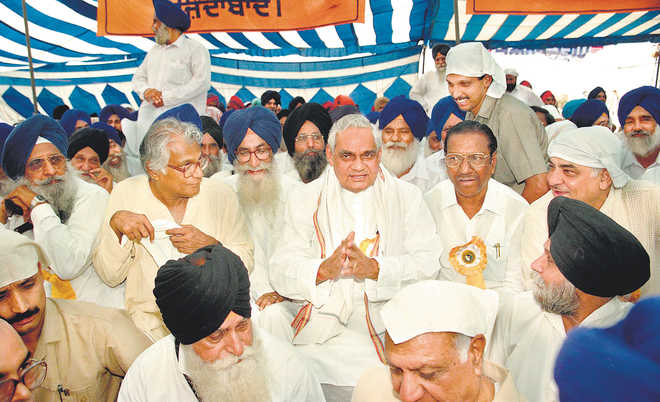
Vajpayee’s presence at the bhog of Sant Harchand Singh Longowal reflected his commitment to regional party leaders. Tribune file photo: Karam Singh
Saba Naqvi
Prime Minister Narendra Modi brought the BJP to an era of single-party rule that Atal Bihari Vajpayee could not have even conceived of at the time when he was Prime Minister (from 1998 to 2004). But as we head to the 2019 elections, it has now entered the realm of possibility that a simple majority could elude the BJP. One must therefore ask if Modi can ever do a Vajpayee?
For Vajpayee did indeed manage the remarkable task of first gathering regional parties around him, ending BJP’s isolation, and then going on to run a stable coalition. It worked because alliance partners did not feel threatened by the BJP. On the contrary, figures such as socialist and trade union leader George Fernandes were as engaged in forming the NDA as Vajpayee and L.K. Advani.
Let’s flashback to the 1998 swearing-in ceremony of Atal Bihari Vajpayee, a modest affair on March 19, that I attended. Sworn in on that day were two regional heavyweights of the time: Ramakrishna Hegde, former chief minister of Karnataka and Surjit Singh Barnala, former chief minister of Punjab. The future of Indian politics, too, was there. No one paid particular attention to the oath ceremonies of Nitish Kumar and Naveen Patnaik. Both would eventually move to their states and become chief ministers and undisputed leaders of their parties. It was a stepping stone in their careers. A year later, Mamata Banerjee, too, would join the NDA and serve as railway minister; she too would emerge as the powerhouse in her state.
Twenty years later, the BJP is in a near hegemonistic position under Modi and president Amit Shah. Many regional players from the TDP to the Akalis to the JD(U) and factions of the disintegrating AIADMK were open to doing business with them — if it were in their self-interest to do so. That is what coalitions are about if they are to succeed: all players, big and small, gain from the process. Vajpayee gave it a rhetorical spin and called it “coalition dharma.”
The current BJP allies obviously see limited gains now in being with the NDA. The most revealing, perhaps, is the case of the Shiv Sena in Maharashtra that shares an ideological orientation with the BJP, yet seems to loathe them quite whole-heartedly these days.
The current BJP only terrifies the smaller parties. The fear is not just about substance, it is also about style. There is a belief that the BJP uses enforcement and income tax agencies to “fix” its opponents; that demonetisation was aimed at making other parties bankrupt; while in the following year, the BJP reported an 82 per cent increase in its own income and thereby became, according to figures filed in the Election Commission, the richest party ever in India’s history.
The earlier unspoken pact among political parties was to live and let live and let all the cronies and capitalists thrive. The present regime has broken that compact and sent others running for cover.
In Gujarat where Modi cut his teeth in electoral politics, he did so by squashing other power centres in his ideological family, be it the old BJP guard led by Keshubhai Patel, VHP leaders such as Pravin Togadia and RSS whole timers such as Sanjay Joshi. He is ruthless, charismatic and very successful. In Delhi now, no one in the BJP today enjoys real power beyond Modi and Shah; the rest are just beneficiaries of power, not the yielders of it, and there is a significant difference in that.
The ruthless model of electoral politics has succeeded — till now. But there are clear limitations to the Shah model when it comes to the business of dealing with parties that would not like to crawl before the BJP command and control.
It requires an all-together different set of skills to cobble an alliance when you fall short and need some self-respecting regional parties to come to your aid. Vajpayee managed it but he was a man who had friends across the political spectrum and he was committed to respecting the parliamentary traditions of our country. The current BJP leadership would do well to imbibe some lessons from the Vajpayee era.



























